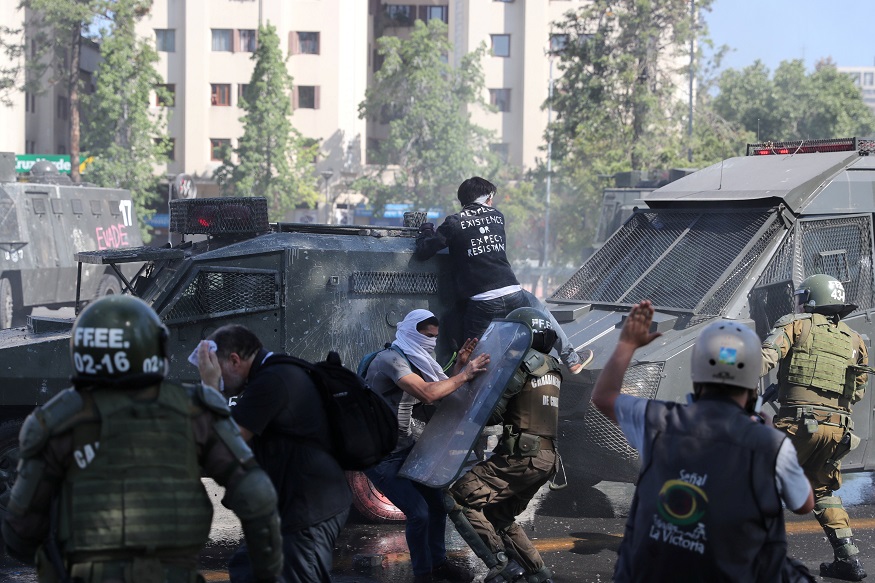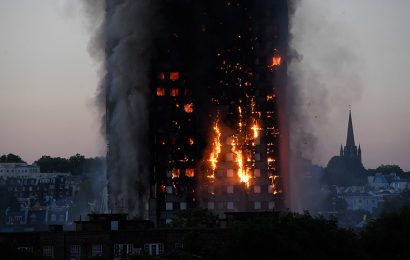The clashes between protesters and almost 9.500 police and military officers have come to using tear gas and water cannons. Five people have already been killed when rioters burn a garment factory in Santiago suburb as police detain 1.462 demonstrators.
Protesters have been setting fire to buses, smashing up metro stations and ransacking shops, due to the anger that was sparked by price hikes and social inequality.
The situation in Chile is critical
Five people were killed on Sunday when a garment factory was torched by looters near Chile’s capital, Santiago, bringing the death toll in a wave of unrest to seven as authorities expanded a state of emergency.
After an emergency meeting late on Sunday, President Sebastian Pinera defended his decision to call a state of emergency and deploy troops onto the streets for the first time since Augusto Pinochet’s military dictatorship between 1973 and 1990.
“Democracy not only has the right, it has the obligation to defend itself using all the instruments that democracy itself provides, and the rule of law to combat those who want to destroy it. We are at war against a powerful enemy, who is willing to use violence without any limits.”
Pinera said in a late-night televised address at army headquarters in Santiago.
“Many latent requests have not been answered, tension has built up, frustration has increased daily in daily life,” said Octavio Avendano, a sociologist and political scientist at the University of Chile. This anger boiled over earlier in the week as a protest against a rise in metro fares escalated dramatically on Friday.
Almost all public transport was paralyzed in Santiago on Sunday, with shops shuttered and many flights cancelled at the international airport, leaving thousands of people stranded due to a curfew imposed from 7:00 pm until dawn.
Authorities reported 103 serious incidents throughout the country with 1.462 people detained – 614 in Santiago and 848 in the rest of the country. “It’s really sad what’s happening, but the people are outraged because they’re not being listened to,” 26-year-old Antonia told AFP in central Santiago.
Several international Chilean football players have also asked leaders in their country to “listen to the people” and to find solutions. “I pray that my beloved Chile will be better,” Chilean star Arturo Vidal, the Barcelona midfielder, wrote on Sunday night.
Chile’s president is making an appeal for calm
President Pinera also appealed to people taking to the streets, saying “there are good reasons to do so” but calling on them “to demonstrate peacefully” and saying “nobody has the right to act with brutal criminal violence“.
Boris Van Der Spek, founder of the independent news website Chile Today, said the president’s intervention might come too late.
Chile protests determine a state of emergency in Santiago
“The protests are more than just about fare increase. It is about the cost of living and the level of inequality in the country. There is so much discontent in Chile. This was always going to happen one way or another.”
he said.
Chile has the highest per capita income of Latin America at $20,000, with expected economic growth this year of 2.5 percent and just two percent inflation.
But there is widespread frustration with economic policies that have virtually privatised all health care and education, at a time that falling pensions and rising costs of basic services have exacerbated social inequality.
Protesters burned several subway stations and damaged dozens of others, and some set fire to an energy company building.
The unrest started as a fare-dodging protest against an increase in metro ticket prices, which increased from 800 pesos to 830 pesos ($1.13 to $1.17) for peak-time travel, following a 20-peso rise in January.
The head of the subway system, Louis De Grange, said the vandalism caused hundreds of millions of dollars in damage and said it was not clear when services could resume.
As a result, some 2.4 million people are likely to experience difficulties getting to work or school on Monday.
Source: aljazeera.com, news18.com



